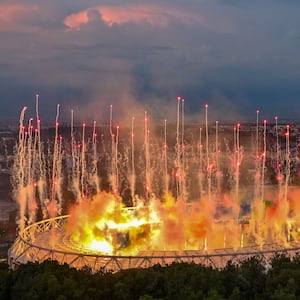ROME—In what should come as a surprise to absolutely no one, the month-long Euro 2020 soccer tournament being held in 11 cities across Europe in front of live crowds has quickly turned into a COVID-19 superspreader event, according to the World Health Organization.
After harsh lockdowns across Europe finally gave way to two months of steady decline in COVID-19 cases, new infections are now back up by 10 percent, fed by ardent soccer fans who traveled between venues, especially those who followed teams to the U.K. and Russia, taking the virus, which is spinning out of control in both countries, back with them. But on Saturday night in Rome, thousands of fans gathered anyway to watch England pummel Ukraine and the night before, Romans took to the streets to celebrate Italy’s win over Belgium—all assembling mask-free, hugging, yelling and doing all of the things we know by now aid in the spread of COVID-19.
The Delta variant—coupled with slow vaccine rollouts and low vaccine rates—has led to worrying new spikes. Russia logged 24,439 new cases and 679 deaths on Saturday, far more than any of the countries participating in the competition, yet thousands of fans traveled to St. Petersburg the previous day to watch one of the competition’s quarter-finals. The U.K. has had to postpone reopening curbs as the country struggles to control the surge of Delta variant cases—despite a strong vaccine rollout—but that hasn’t stopped people from scooping up tickets to the final, to be held at Wembley on July 11.
While the European soccer governing body UEFA has required that strict norms including COVID-19 tests and social distancing be followed inside the stadiums, no one seems to be keeping tabs on the rowdy crowds after they leave or in fan zones, where yelling, hugging and high-fiving go unchecked. On Saturday night in Rome, police stopped hundreds of English and Ukrainian fans out on the streets. If they couldn’t prove they had quarantined (five days for British and 10 for Ukrainaian), they were fined €3,000. “We need to look beyond the stadiums themselves,” WHO senior emergency officer Catherine Smallwood said in a statement. “We need to look at how people get there, are they traveling in large crowded convoys of buses, And when they leave the stadiums, are they going into crowded bars and pubs to watch the matches?”
Simple contact tracing has turned up a staggering set of statistics that beg the question: why didn’t anyone think about this earlier? In Scotland, 1,991 fans attended a match there while they were infectious, the health ministry confirmed. Then 1,294 of those fans went to London. Of those, nearly 400 attended the England vs. Scotland match at Wembley where the final will be held on July 11. It is just as bad in other venues. Some 300 Finnish fans are known to have contracted COVID-19 when they traveled to Russia to watch the June 16 match there. UEFA has been asked to consider moving the last three matches of the competition away from London, where the final match is scheduled for July 11, in order to stop fans from spreading the infections any further.
In Italy, where new infections have finally dipped below 1,000 for the first time since last summer, the Italian government took the unprecedented step of not only banning fans from England who had planned to come to watch Saturday’s match against Ukraine at Rome’s Olympic Stadium, but also of canceling their tickets to prevent them from attending. English fans had until Thursday night to transfer tickets to people residing inside Italy. After that, UEFA was compelled to cancel and refund them.
Last month, Italy set a five-day quarantine for all people traveling from England in a bid to deter people from attending the match, but it proved difficult to enforce even with the threat of €3,000 fines for those who defy it. The Daily Beast interviewed several British fans at a pub outside the Olympic stadium on Saturday evening ahead of the match and they all “lived in Europe” and could therefore attend. But not one had been asked to show proof of residency.
UEFA, which had to cancel the tournament last year at a loss of millions in sponsorships, has brushed off criticism and passed the buck to host cities. “The final decisions with regards to the number of fans attending matches and the entry requirements to any of the host countries and host stadiums fall under the responsibility of the competent local authorities, and UEFA strictly follows any such measures,” the governing body said in a statement.
But that has meant that in cities like Budapest, matches were held in the Puskas Arena stadium that was filled to full capacity, with 60,000 spectators. Other venues, including Rome and London, have limited audiences to 25-50 percent so far, instead hosting “fan zones” where spillover fans have gathered. In the final three games of the tournament, Wembley is also set to hold 60,000 people.
UEFA has come under fire for putting profit before common sense. German Interior Minister Horst Seehofer called the group “utterly irresponsible” at a press conference, urging fans to forgo in-person events. “I cannot explain why UEFA is not being sensible,” he said. “I suspect it is due to commercialism.”
Last year, cases dropped dramatically during the summer months, only to spike again in the fall, leading to widespread lockdowns. The WHO now predicts that if the last week of the European soccer tournament goes on as planned, a surge will likely sweep Europe before summer is even over.






